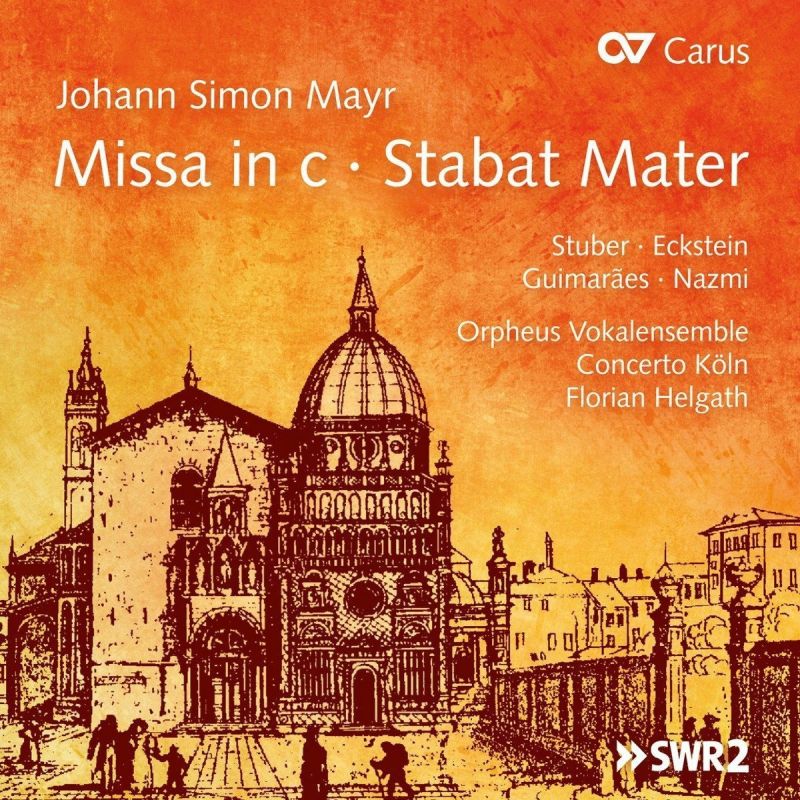MAYR Einsiedeln Mass. Stabat mater
View record and artist detailsRecord and Artist Details
Composer or Director: (Johannes) Simon Mayr
Genre:
Vocal
Label: Carus
Magazine Review Date: 09/2017
Media Format: CD or Download
Media Runtime: 78
Mastering:
DDD
Catalogue Number: CARUS83 480

Tracks:
| Composition | Artist Credit |
|---|---|
| Missa |
(Johannes) Simon Mayr, Composer
(Johannes) Simon Mayr, Composer Concerto Köln Fernando Guimaraes Florian Helgath, Composer Katja Stuber Marion Eckstein Orpheus Singers Tareq Nazmi |
| Stabat Mater |
(Johannes) Simon Mayr, Composer
(Johannes) Simon Mayr, Composer Concerto Köln Fernando Guimaraes, Tenor Florian Helgath, Composer Katja Stuber, Soprano Marion Eckstein, Contralto Orpheus Singers Tareq Nazmi, Bass |
Author: Richard Wigmore
Mayr’s Kyrie, overtly based on the opening theme of Beethoven’s C minor Piano Trio, Op 1 No 3, has an imposing gravitas. Thereafter much of the Mass, with its jaunty march rhythms and tootling woodwind solos, sounds like opera buffa by other means – typical of Italian sacred music of the day. Rapidly losing his sight in the mid-1820s, Mayr filched movements by his star pupil Donizetti for large chunks of the Credo. Never can the Resurrection have provoked such unbridled jollity as here. Yet amid the rather facile theatricality – Donizetti’s and Mayr’s own – are moments of real imagination and power: say, in the dramatic choral interjections of the ‘Qui tollis’, or the ‘Crucifixus’, with its tortuous violin obbligato and ominous hushed trumpets. And if Mayr’s mellifluous setting of the ‘Agnus Dei’ is neither shadowed nor supplicatory, it is enlivened by a florid clarinet solo that could have strayed out of a Weber Clarinet Concerto.
The Stabat mater from some 20 years earlier is a similarly mixed bag. Gently expressive numbers, often with a nod to Pergolesi’s famous setting, rub shoulders with movements that seem almost indecently cheerful, even by the Italian standards of the time. The fervent plea to the Virgin in ‘Eia mater’ here becomes a cue for a frolic around the Cross, courtesy of a skittering duet for soprano and solo violin. Despite moments of flatness, Katja Stuber sings this with grace and spirit. Of the other soloists, Tareq Nazmi impresses with his dark, hieratic bass, while Fernando Guimarães sings his ‘Stabat mater’ solo with attractive lyrical tone and shapely phrasing, and combines eloquently with Stuber in the Mass’s ‘Qui tollis’. Under Florian Helgath’s vigorous direction the chorus sound disciplined and full-bodied, though they are not best served by the cavernous church resonance. A prime pleasure in works that blur the sacred and the secular is the playing of Concerto Köln, whether en bloc or in the instrumental solos that so often redeem Mayr’s invention from blandness.
Discover the world's largest classical music catalogue with Presto Music.

Gramophone Digital Club
- Digital Edition
- Digital Archive
- Reviews Database
- Full website access
From £8.75 / month
Subscribe
Gramophone Full Club
- Print Edition
- Digital Edition
- Digital Archive
- Reviews Database
- Full website access
From £11.00 / month
Subscribe
If you are a library, university or other organisation that would be interested in an institutional subscription to Gramophone please click here for further information.




